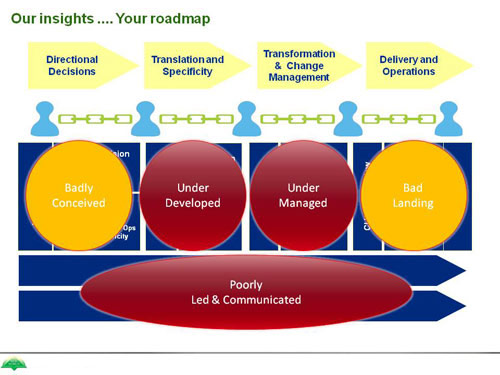
Intellectual Capital
All too often, claimed intellectual capital is a massive proprietary process. More often than not these tend to slow down development and create a great deal of new, and expensive, process.
Our approach to intellectual capital development has been fundamentally different. We have focused our development over 25 years on decision-frameworks and thought-frameworks that add immediate value. We use these to stimulate and facilitate management teams.
Our intellectual capital has two forms: 1) an overall framework of thinking that supports developing the big 5 successfully, and 2) around 150 proven individual thought-frameworks for particular topics within this. Very often our work is to bring 2 or 3 key frameworks to life within an organisation. The overall architecture we call the "value creation chain" and this is now the subject of a course on delivering strategic transformation.

The various thought frameworks cover all topics from mission and portfolio strategy through to how to achieve communal governance of a change programme and how to underpin successful delivery. These tools provide a great deal of power in our projects and clients repeatedly tell us that one or more of our thought-frameworks has been fundamental to changing the way they work.
This is perhaps best brought to life through an example. We were recently asked to bring some quality thinking to the NHS in response to the recent White Paper – working with the GP community and the board of the local PCT. There were 4 frameworks that underpinned the success of this work, and perhaps the most impactful was one about the conditions under which a bottom-up transformation is likely to succeed. Here is the key slide as an example of the 150 ... it was first developed in the late 1980s to help understand some large transformations.

As you can see the tool is not about large amounts of process or analysis, rather it is a challenging thought tool that helped the team realise that the conditions were not right, and that the focus needed to be on reducing risk and strain. We then went through a facilitated process to take this thought process to a conclusion and the result is the largest pathfinder GPC in the country and a transformation programme that gives it a high odds of success within the chaos that is currently occurring across the NHS.
"I firmly believe we would not have reached this point so quickly, and that our internal changes would not have been so clear, without NW's insight..... we got lost in the mechanics rather than the real essence." .... CEO, NHS PCT